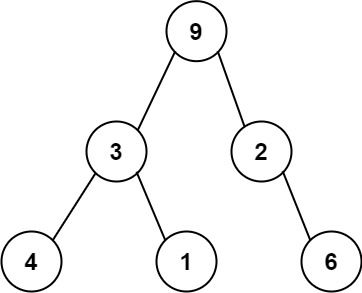| comments | difficulty | edit_url | tags | ||||
|---|---|---|---|---|---|---|---|
true |
Medium |
|
One way to serialize a binary tree is to use preorder traversal. When we encounter a non-null node, we record the node's value. If it is a null node, we record using a sentinel value such as '#'.
For example, the above binary tree can be serialized to the string "9,3,4,#,#,1,#,#,2,#,6,#,#", where '#' represents a null node.
Given a string of comma-separated values preorder, return true if it is a correct preorder traversal serialization of a binary tree.
It is guaranteed that each comma-separated value in the string must be either an integer or a character '#' representing null pointer.
You may assume that the input format is always valid.
- For example, it could never contain two consecutive commas, such as
"1,,3".
Note: You are not allowed to reconstruct the tree.
Example 1:
Input: preorder = "9,3,4,#,#,1,#,#,2,#,6,#,#" Output: true
Example 2:
Input: preorder = "1,#" Output: false
Example 3:
Input: preorder = "9,#,#,1" Output: false
Constraints:
1 <= preorder.length <= 104preorderconsist of integers in the range[0, 100]and'#'separated by commas','.
We split the string preorder into an array by commas, then traverse the array. If we encounter two consecutive '#' and the third element is not '#', we replace these three elements with a single '#'. This process continues until the array traversal is complete.
Finally, we check whether the length of the array is '#'.
The time complexity is preorder.
class Solution:
def isValidSerialization(self, preorder: str) -> bool:
stk = []
for c in preorder.split(","):
stk.append(c)
while len(stk) > 2 and stk[-1] == stk[-2] == "#" and stk[-3] != "#":
stk = stk[:-3]
stk.append("#")
return len(stk) == 1 and stk[0] == "#"class Solution {
public boolean isValidSerialization(String preorder) {
List<String> stk = new ArrayList<>();
for (String s : preorder.split(",")) {
stk.add(s);
while (stk.size() >= 3 && stk.get(stk.size() - 1).equals("#")
&& stk.get(stk.size() - 2).equals("#") && !stk.get(stk.size() - 3).equals("#")) {
stk.remove(stk.size() - 1);
stk.remove(stk.size() - 1);
stk.remove(stk.size() - 1);
stk.add("#");
}
}
return stk.size() == 1 && stk.get(0).equals("#");
}
}class Solution {
public:
bool isValidSerialization(string preorder) {
vector<string> stk;
stringstream ss(preorder);
string s;
while (getline(ss, s, ',')) {
stk.push_back(s);
while (stk.size() >= 3 && stk[stk.size() - 1] == "#" && stk[stk.size() - 2] == "#" && stk[stk.size() - 3] != "#") {
stk.pop_back();
stk.pop_back();
stk.pop_back();
stk.push_back("#");
}
}
return stk.size() == 1 && stk[0] == "#";
}
};func isValidSerialization(preorder string) bool {
stk := []string{}
for _, s := range strings.Split(preorder, ",") {
stk = append(stk, s)
for len(stk) >= 3 && stk[len(stk)-1] == "#" && stk[len(stk)-2] == "#" && stk[len(stk)-3] != "#" {
stk = stk[:len(stk)-3]
stk = append(stk, "#")
}
}
return len(stk) == 1 && stk[0] == "#"
}function isValidSerialization(preorder: string): boolean {
const stk: string[] = [];
for (const s of preorder.split(',')) {
stk.push(s);
while (stk.length >= 3 && stk.at(-1) === '#' && stk.at(-2) === '#' && stk.at(-3) !== '#') {
stk.splice(-3, 3, '#');
}
}
return stk.length === 1 && stk[0] === '#';
}